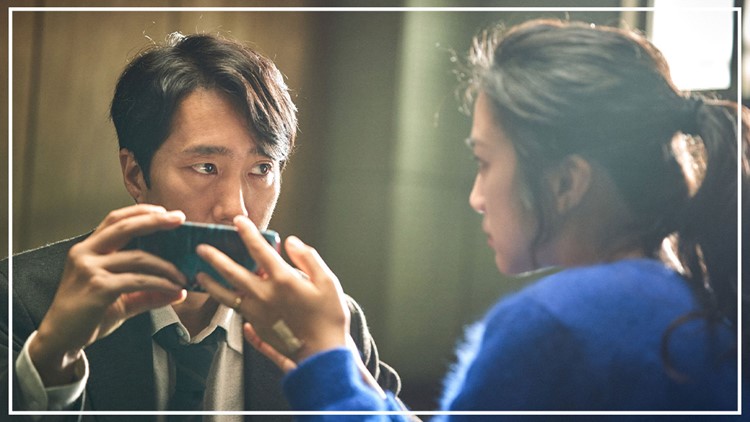TEXAS, USA — In a film with enough awe-inspiring visual ingenuity to power a college course, one particular flourish serves as a most elegant and electrifying summation of the conflict lying at the heart of Park Chan-wook’s newest stunner, “Decision to Leave.” It finds us peering at the incredulous face of Detective Jang Hae-joon (Park Hae-il) from behind his cell phone screen, a texted invitation from the women suspected in her husband’s death splayed out across a perspective that’s been inverted, much like every other lens Hae-joon has gotten used to examining the world through.
Though the audience hasn’t been in this world for very long, our own footing in it has become as shaky as its presentation is controlled. Called upon to find the killer of a mountain climber who has mysteriously plummeted to his death, common sense leads Hae-joon to the victim’s wife, Song Seo-rae (Tang Wei), whose history of abuse at her dead husband’s hands brings her to the interrogation room.
So far, so police procedural—except that the mood blooms into that of a first date when Hae-joon orders expensive sushi for the two of them, dreamy sunlight pouring into the police station. Hearts don’t close themselves as easily as cases do, it turns out, and Seo-rae soon becomes as much a target of infatuation as of suspicion.
Such complications become the arena for Park to pit the sensuality of blooming romance against the stoicism of police work, to dazzling formal ends. In one moment Hae-joon is keeping tabs on Seo-rae under the cover of night; the next he appears as if to be in the same room as her, a clever sequence that underscores the job's inherently voyeuristic foundations. The camera itself boasts personality of its own; manned by Kim Ji-yong, it finds those slippery angles by which we and only we notice the duo stealing looks, consummating mutual desire in circumstances that demand they both keep their guard up.
The paradox creates early scenes both sexy and funny, the will-they-won't-they energy offset by Park's mischievous tendency to find the playfulness in every scene. Then “Decision to Leave” takes an existential pivot, zeroing in on the staring contest between practicality and emotion that informs the more heartbreaking dilemmas that await in Park and Jeong Seo-kyeong’s script—one that actually revolves around two murder investigations and heavier jolts of self-incrimination.
That Park’s first movie in six years turned out to be more gorgeous than gruesome might feel contradictory in its own right, given that the Korean filmmaker has heretofore forged a legacy in the blood of his early-2000s revenge thrillers before cementing it with 2016’s deliciously twisted “The Handmaiden.” By comparison, “Decision to Leave” has little blood and pretzeled plotting. But in opting to spin a story whose soulfulness matches up to his characteristically virtuosic craft, Park internalizes the dizzying thrills we expect from his movies—imbuing “Decision to Leave” with a dark heart that might leave you as shaken about your own hopes for its protagonists as they are of their own.
It also asserts that, as we watch a typically reliable investigator rejecting his instincts, Park isn’t abandoning his own fascination with the structures of genre, nor his desire to rattle them. That one can watch “Decision to Leave” primarily as a police procedural or a fatalistic romance harkens to a more classical era of cinema, when protagonists who didn’t know what was good for them was a novelty and obsession was the movies’ most destructive force. Unfolding in a bluish-green-glowing part of urban Korea, you’d be forgiven for thinking Seo-rae and Hae-joon’s romance is waterlogged even before they cross paths.
“Decision to Leave’s” drama – indeed, its tension and comedy too – flourishes from watching Hae-joon being continuously strung along by Seo-rae and wondering how willfully he’s rejecting his own nature for a woman he never quite has a handle on. Each exchanged text and prolonged glance is another crack in his hardened identity as a superlative young detective, one whose content being away from his wife for long periods of time without really articulating why. For her part, Seo-rae is no mere object for Hae-joon to reflect his longing but a character staving off a fracturing of her own. She might be acting out of self-interest, but couldn’t you say that of criminals and lovers both?
If crime stories pull us along out of an expectation that we’ll receive tidy resolution, “Decision to Leave” derives its luster (and its lust) from maintaining ambiguity in a second half increasingly defined by desperation so stark that it seemingly can only come from pure intentions. That’s partly thanks to the magnetic work of Park and Tang, tasked with playing characters straddling the line between primal longing and the disorientation of unresolved history. Like Paul Thomas Anderson and Quentin Tarantino, Park is a master at drawing exactly the right kind of peculiar performances from his actors while making them feel of apiece with the mood he’s established… however thrillingly frenzied that mood may be.
It also comes from the sheer propulsion of Park’s narrative. This is no time-travel movie, yet it’s impressive all the same how “Decision to Leave” jostles between past and present, revealing new details not by uncovering what was hidden but by adjusting emotional wavelengths so that they become their own kind of magnifying glass. Love emboldens and distorts in “Decision to Leave,” which is why it’s easy to forgive a screenplay whose parts may not lock as exactingly as they did in “The Handmaiden,” or with the same seismic force. In fact, it’s eerily appropriate for this story; a measure of obsession tarnishing the evidence, and answers becoming crystal-clear only after we’ve forgotten the questions.
"Decision to Leave" is not rated. It's now streaming on MUBI. Runtime: 2 hours, 19 minutes.
Starring Park Hae-il, Tang Wei, Lee Jung-hyun, Go Kyung-Pyo
Directed by Park Chan-wook; written by Park and Jeong Seo-kyeong
2022
---
>MORE MOVIE REVIEWS:



